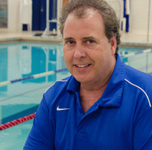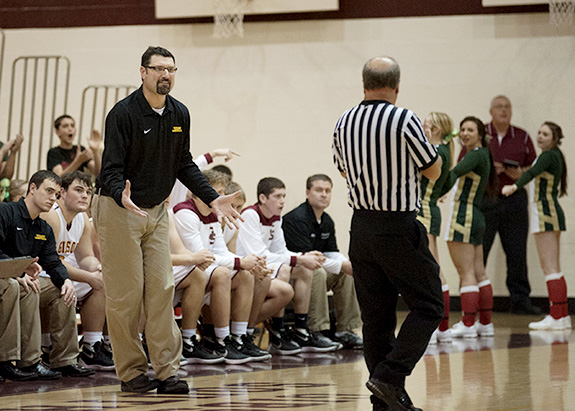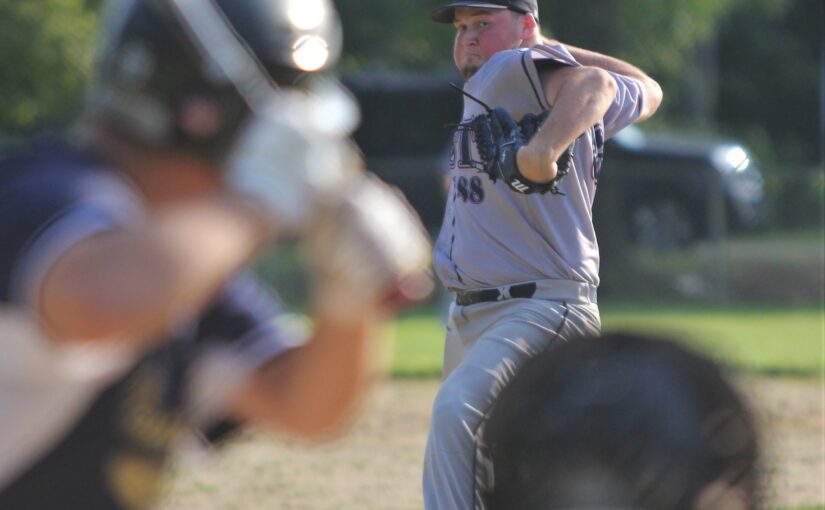Bob Jenkyns: Maintaining Success From The Ground Up
 Bob Jenkyns,Boys Swimming Bob Jenkyns,Boys Swimming
|
It also helps when the high school coach is the same person helping to oversee that operation.
Varsity swim coach Bob Jenkyns says the uniform system for development is a major reason the squad is able to have sustained success. The way he sees it the program never rebuilds after losing member to graduation—it reloads.
“That’s basically the concept here,” Jenkyns says, sitting in his small pool house office away from the pungent odor of chlorine. “The freshmen and sophomores, when they come into this program, they realize the history, they realize what it takes to be on varsity and they work hard. They strive to be on that varsity team, so when those seniors move on, we have guys in the wings ready to step in, and we pick up where we left off.”
Modeling the county’s own “farm system” has paid off, assuring Arrowhead it puts a competitive team in the pool each year. Jenkyns, who previously was both the boys and girls head coach, helped the program win nine state championships during his tenure at the school. It also has more than a dozen runner-up finishes.
The Lake Country Phoenix, a “competitive youth swimming coaching and training” organization, serves more than 300 up-and-coming swimmers, according to the group’s website. Lake Country develops swimmers’ skills, character and values, preparing them for what lies ahead in the world of competitive athletics.
The organization was created in 1982 and has become very popular in the Harland, Wis., area. It’s staffed by full-time and many part-time coaches who are certified and experienced in the sport.
Working full-time with Lake Country in addition to coaching the varsity boys team can be exhausting, but it also allows Jenkyns to build relationships and provide specific insight to children about what it takes to make it at the higher levels. He says most students understand they must exercise patience, but the rewards come to those work the hardest.
“I really think they understand when you come in as a freshman, unless you’re a blue-chip athlete, you bide your time and your time is going to come,” Jenkyns says. “But that time needs to be used wisely so you’re ready to step in, and I really think that’s a huge factor in our success year after year.
“The sophomores and freshmen and trained by our junior varsity coaches to be ready when it’s their turn in their junior and senior years.”
Maintaining A Balance
Jenkyns, like many high school coaches these days, undergoes a daily balancing act between his responsibilities with Lake Country and Arrowhead. With his full-time job at Lake Country, he is the head age group coach and business manager. That means he spends eight hours each day working with hundreds of children in addition to maintaining responsibilities with the newsletter, meet entries and other business tasks.
Pile that on top of his duties with the varsity team, and the schedule can become pretty hectic.
“This pool is just used non-stop,” he says. “The only break it gets is right now (late spring), but in the fall and winter it’s definitely used from 3 until 9 p.m., but also during the day with gym classes and things like that.”
Helping Jenkyns maintain the organization of the high school program is a small group of assistants. The boys team has two swim coaches and one diving coach, who all work with the 24 to 40 boys that make the no-cut roster each season.
Jenkyns does the hiring for his staff, and he grants them full autonomy of their individual program. That includes writing practices for the freshman and junior varsity teams and determining what lessons are most important. That system hasn’t proved him wrong yet, he says.
Swimming practices are a bit unique when compared to other sports that focus heavily on defense or strategies specific to one opponent. Jenkyns says most of the time is spent with technique or racing in an attempt to better each swimmer’s time. The ultimate goal is to prepare for the state championship meet, where they must be in top physical and mental shape.
“Teamwork is extremely huge, and one guy swimming out of his mind and the rest not isn’t going to win a state championship,” Jenkyns says. “They all need to be fired up, they need to be there for each other, and if one guy has a bad race, the rest of the team need to know how to rally around him, support him and bring him back up.”
Among desire and passion, Jenkyns says the most important quality in his assistants is ethics. He expects coaches and athletes to abide by the rules and practice sportsmanship.
“We can’t be telling them one thing and then acting differently ourselves,” he says. “With the coaches they need to be prompt, they need to be ready to go on time, enthusiastic, and basically all the characteristics we want our athletes to have.”
Battling Complacency
The state championship banners hanging inside the pool house recognize the program’s achievements, but Jenkyns is quick to point out they mean nothing to its future success. The boys are left to determine that on their own.
It’s a brand new team each year, and Jenkyns says getting the team to understand that is the first key concept.
“Those teams of the past, we’re honored and we’re tremendously proud, but I don’t see a banner with your year on it, and we really put that into the guys’ laps,” he says. “I say I’m going to do everything I can to train and prepare you guys, but you have to wait it and come together as a team.”
Another important element is community support and the respect earned by swimmers from other athletes. Jenkyns says his group constantly works, even getting to the pool some mornings as early as 5 a.m. to slip in a workout before class.
The swim team does all the right things, but Jenkyns acknowledges the mounting pressure can be difficult when surrounded by so many championships in one school. It also serves as a constant motivator for his staff and the athletes.
One of the best bits of advice Jenkyns gives for other coaches out there is to enjoy the small things. It makes the job much more rewarding.
“One of my greatest moments is watching a swimmer break a minute in the 100 freestyle for the first time ever,” he says.
“Just watching his eyes light up and the excitement and all that—enjoy the small moments. Enjoy those things that make coaching athletics special because there are a lot of other challenges and other things that are going to make you wonder why you are doing this. But those special moments make it worthwhile.”





